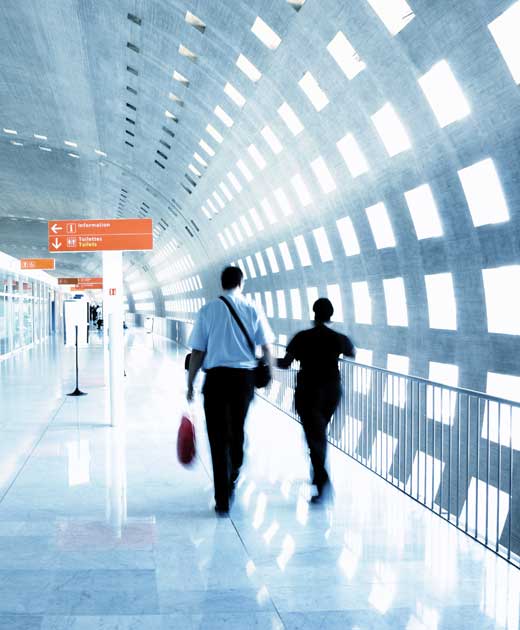
The health and safety of your employees is paramount when they are travelling – especially overseas. While a business trip might go without a hitch most of the time, sometimes things can happen – and when they do, you need robust corporate travel safety and security procedures in place to deal with them. From the issues around personal health and security, to understanding how to get around and interact with the locals, a travel manager needs to make sure that their employees have everything they need to stay safe and well abroad.
With this in mind, read on and make sure you get all the advice you need to keep your business travellers safe on the road.
Assessing risks and researching the destination
If your employees often travel to different parts of the world, here are some of the key scenarios you should prepare for:
- Cultural misunderstandings. Make sure your travellers are familiar with local customs to avoid making a faux pas. It’s also a good idea for them to read up on cultural and business etiquette, and learn a few spoken phrases, so their trip goes as smoothly as possible.
- Adverse weather. Events such as floods, earthquakes and hurricanes are more common than you might think in certain parts of the world. Make sure your travellers are prepared for this by staying up to date and keeping them informed about weather warnings with apps and tools like CWT Safety and Security.
- Civil unrest. Political instability can affect travel plans and put travellers in jeopardy. Terrorism is an added risk that can also lead to severe disruption. The best way to ensure corporate traveller safety is by following the latest travel advice with CWT Safety and Security for the country your travellers are visiting.
- Unpredictable local laws. Activities such as drinking alcohol and smoking are frowned upon in some countries. In others, they could even be illegal. Remember your travellers are representing your business during their trip, so to avoid embarrassment – or worse – research local laws before your travellers risk inadvertently breaking them.
- Lack of medical support. Traveling can expose people to a number of potential illnesses and injuries. Give yourself peace of mind by partnering with corporate travel specialists CWT, which works with International SOS – the world’s largest medical and travel security firm.
Preparing employees for international travel
If your business travellers are moving between countries, they’ll need to have access to key information at every stage of their trip. Ensure corporate traveller safety by making sure your employees:
- Have the right travel documents. Your delegates will need to prove their right to enter other countries if travelling internationally. They’ll definitely require a passport, travel tickets and occasionally a visa. CWT partners with visa services company CIBT to assist with the occasionally arduous task of getting a visa for international travel, making the whole process more efficient - meaning less stress for the traveller. It’s a good idea to keep any essential documents – including insurance, hotel confirmations and car rental details – in one safe place so they don’t go missing.
- Pack properly. Important travel documents aside, there are many other items your business travellers need to bring on their trip. From laptop chargers and adapters to breath mints, there are many items they might not realise are essential until it’s too late – so make sure they follow a packing checklist.
- Know where they need to go. It’s essential your travellers have all the details they need to get to their destination. Travellers can put themselves in danger and waste valuable time by getting lost in an unfamiliar country – so give them the travel directions they need to know. Consider pre-booking cabs from the airport to the hotel in unpredictable destinations.
- Are aware of local customs. Knowing local etiquette can help you avoid appearing rude. Make sure to educate delegates on important cultural differences.
- Have key contact information. Your travellers should know how to contact International SOS, local emergency services, and anyone in your organisation who could help in case of disruption or other issues.
Keeping travellers healthy
If your employees don’t feel healthy on the road, they’re unlikely to perform at their best in business meetings, or produce quality work. While you often can’t predict health issues, you can plan how to manage them in advance. There are a number of health-related considerations to be aware of while travelling, including:
- The availability of healthcare. Make sure your travellers know where they can get medical support before they need it. International SOS provides medical, clinical and security assistance worldwide and can advise on the best course of action for any health problems, 24 hours a day, 7 days a week.
- Food and water safety. Getting a flavour of the local cuisine is a prospect that will excite many travellers. However, some parts of the world might not have the same hygiene standards as at home. Travellers should avoid street food, and particularly dishes like salads, which might not have been properly treated, washed or prepared. Similarly, travellers shouldn’t take any chances with tap water, and drink bottled water instead.
- Health threats and diseases. Stomach upsets, altitude sickness and heat exposure are some of the most common medical problems when travelling abroad. It’s important to make sure you take the right over-the-counter remedies, so make sure you do your research beforehand.
It’s also essential your travellers complete any necessary vaccination courses for the country prior to travelling, and have comprehensive travel insurance that includes emergency medical repatriation.
Getting around
Your travellers will likely be taking various forms of ground transportation on their business trip. The more travelling methods they take, the greater the number of risks. Make sure your employees follow these corporate traveller safety tips when:
- Driving. Travelling by car is often the easiest and quickest way to get from A to B, so if your travellers are permitted to drive in a different country, it’s an option worth considering. Travellers will need to ensure they have their driving licence with them at all times, and should take care to book with reputable car hire firms. Some destinations may also have very different driving rules – for example, motorists might drive on the opposite side of the road. Routes may also be congested, making it difficult for drivers to navigate, particularly if they’re tired from travelling, so a taxi might be a safer option here.
- Taxi. If your travellers need a taxi, make sure they only use a reputable, registered one. If possible, always pre-book rather than accepting one off the street.
- Public transport. The safety levels of a destination vary greatly between cities, and even neighbourhoods within cities, at certain times of day. To ensure your corporate travellers’ safety, research public transport options where they’ll be passing through – or whether a car and driver is recommended.
Personal security
Sometimes your travellers might be so preoccupied with their meetings or conferences, they might neglect to research the crime levels, safety standards and neighbourhoods to avoid in their destination. Make sure you educate them around these key areas:
- A country’s background. Whatever the domestic issues a country is facing, make sure you keep your travellers informed about it. That way they can stay vigilant and avoid areas of unrest where possible.
- Crime and the law. Some destinations could be renowned for having high level of a certain type of crime - pick-pocketing for example. Check out the most common crimes in the area and you can bring in measures to protect against them, whether your travellers need a guard or just a secure place to put their valuables.
- Security training. Keep staff safe through risk prevention training, or training for other specific personal security measures.
At CWT, we’re on hand 24/7 to react to any risks your employees face on their trip. We have representatives in every region across the worldwho are ready to help in an emergency situation. Working with International SOS, the world’s largest medical and travel security services firm, we’ll help you keep your travellers safe on the road at all times. Find out more about our business traveller care programs.



